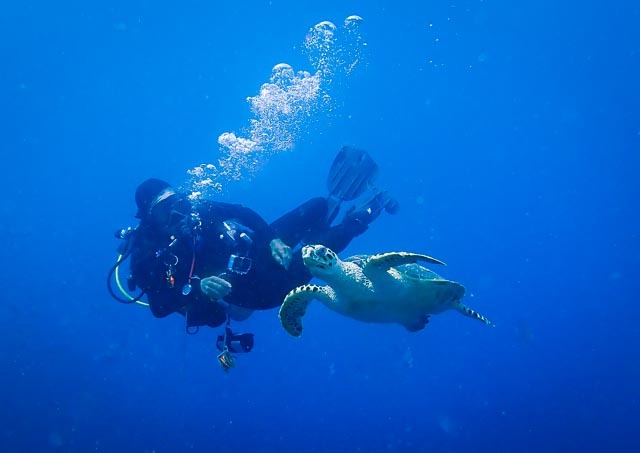One of my greatest passions in life (besides helping people find their joy and authentic power) is scuba diving. I scuba dive as much as I can whenever possible. If you are fortunate enough to discover what brings you genuine joy, include that experience in your life…no matter what it takes.
Scuba diving is like an active form of meditation, becoming more aware of stillness within our bodies as we connect breathing with movement. And like meditative experiences, diving is mostly silent, almost weightless, and virtually timeless.
I love the fact that scuba diving is mostly silent. There is no sound other than the sound of your breath and bubbles. The sensations of diving can create a deep sense of calmness that is much more difficult to achieve on land due to sound distractions. It’s easy to be present in the silence while scuba diving as the usual noises of life like traffic, cell phones, and people talking remains at the surface.
Even more than the silence, I love that the ocean does not care who you are or what you do for a living. Ego is checked at the surface as divers become one with a sea of potential.
Scuba diving is also mostly a weightless experience. When diving, you essentially merge with the ocean and allow the currents to carry you forward. While diving, the body is practically lightweight, cradled effortlessly by the calming waves.
Scuba diving is also a timeless experience. While diving, there is a tendency to lose track of time as the focus is purely within the present moment. One minute can feel like an hour when watching a sea turtle swim past a coral wall or manta rays performing ballet during their cleaning ritual.
If not for dive computers and gauges keeping track of air consumption, dive time, and depth, the experience of linear clock time would cease to exist. Divers, present to the allure and completeness of the moment, would be fully immersed in the sea’s eternal now.
Scuba diving requires following certain physics principles as a matter of safety and survival. Following the basic rules of diving also ensures the experience is fun and rewarding. While proper training for scuba diving is essential, the six fundamental principles to follow when diving underwater also pertain to everyday life. Following these principles as gentle, loving guidelines for yourself while navigating through the varying waves of life can make the difference between feeling pummeled by experiences or thriving through the tides of change.
They are:
- Always Breathe. Never hold your breath.
- Buoyancy Control. Stay neutral.
- Monitor your Gauges. Mind your state.
- Pay Attention to Currents. Know the state around you.
- Safety Stop on Ascension. Temperance. Take things slowly. Know your limits.
- Plan the Dive and Dive the Plan. Set realistic expectations while ensuring you meet desired goals.

The author diving in Raja Ampat, Indonesia.
Photo courtesy of SiK.
- Just Breathe. Inhale and exhale fully.
This rule is an essential principle of scuba. Holding breath underwater can result in severe injury and even death. The air in a diver’s lungs naturally contracts during descent and expands during ascent. As long as the diver breathes continuously, this is not a problem because excess air can escape. However, when a diver holds the breath, air can no longer escape as it expands. Eventually, the alveoli that make up the lung walls will rupture, causing severe damage to the organ, known as pulmonary barotrauma. Depth changes of just a few feet are enough to cause lung-over expansion injuries. Thus, holding one’s breath is dangerous not only when ascending, but at all times while scuba diving. Avoiding pulmonary barotrauma is easy; continue to breathe at all times.
The triggering impulse to breathe underwater occurs through the build-up of carbon dioxide rather than the desire for oxygen. Suppose a diver does not exhale fully while diving, then carbon dioxide can accumulate in the body. This build-up can elicit irregular and shallow breathing, which can lead to increased anxiety and panic underwater. So, by exhaling fully, a diver removes more carbon dioxide, which keeps the diver breathing steady and feeling calm.
Unlike when scuba diving underwater, we take this rule of breathing for granted on the land’s surface. Breathing often happens naturally without thinking about it.
However, when we are stressed, worried, or in fear, our breathing tends to become more shallow, restricted, and constricted in everyday life. Such shallow breathing leads to potentially harmful changes in our brain and physiology.
Deep breathing has been proven to help with wellbeing, prolongs the aging process, and boosts the immune system. Deep breathing is also clinically proven by scientists to relieve anxiety and depression.
The number one rule in scuba diving is the number one rule in life. Just Breathe.
- Buoyancy Control. Maintain neutral buoyancy and the weighting game.
Scuba dive buoyancy control is a fundamental skill. Precise control of buoyancy is what enables a diver to hover completely motionless and fin in any direction hands-free.
Being adequately weighted for a dive is super important. If a diver is over-weighted at the dive’s start, the diver will quickly sink to the bottom. The diver will also have a lot of drag, preventing that weightless state. A diver can rectify the issue by adding air to the BCD (buoyancy control device) from the tank. However, suppose the diver changes depths (which happens consistently in a dive). In that case, the diver will need to make constant air adjustments in the BCD to compensate for the excess weight. Being overweight also puts stress on the body that will require more oxygen and subsequently shorten a dive.
Conversely, suppose a diver doesn’t have enough weight and hasn’t mastered buoyancy through proper breathing. In that case, the diver will have difficulty descending and will remain stuck at the ocean surface.
The art of buoyancy control is a skill that a diver can fine-tune with practice and support from more experienced dive instructors.
Everyday reality challenges us to monitor buoyancy control. What weighs us down, creates drag, and prevents us from floating effortlessly through the changing currents of our life must be considered. How much weight (fear, negative beliefs, self-perpetuated limitations) can we release to navigate with ease through upcoming challenges? What opportunities open to us when we choose to travel light?
Many fears are unnecessarily heavyweights that keep us relatively immobile and tend to create drag in our life. When we release our fears, we feel automatically more buoyant in life.
- Monitor your gauges. Mind your state.
An important rule in scuba diving is always to be aware of your gauges, which typically track depth, location, and amount of air remaining in the scuba tank. Suppose you aren’t continually aware of your gauges. In that case, you may suddenly find yourself out of air when you are too deep to return to the surface safely.
In life, we need to keep track of our inner gauges, which I refer to as minding our state. We can’t run our lives on an empty tank. Similarly, we need to know our depth, location, and direction. If we don’t know where we are in our life or how deep we may be in a situation, it isn’t easy to understand where we are going or how to get there. Minding our state is an internal calibration that we must make continually in our lives.
- Pay attention to currents. Know the state around you.
The state around you, what is ‘currently’ happening, is so important in scuba diving. Suppose a diver is not paying attention, and suddenly the currents change directions. In that case, the diver can be rapidly thrust upward toward the surface, downward to great depths, or whisked out into the great blue, possibly never seen again.
Divers learn to watch the currents by paying attention to the behavior of the marine life. When a school of fish suddenly changes direction in synchrony, that’s a cue that the current has just changed.
This principle is also at play in everyday life. It is essential to pay attention to the currents around you lest you be unaware of your surroundings’ changing dynamics. Being apprised of current affairs in your own life can make the difference between being a victim of circumstances or having a fun and fulfilling experience.
- Safety stop on ascension. Temperance.
When ascending to the surface following diving at a certain depth over time, a three-minute safety stop is often required to allow the body and lungs to adjust. Ascending a dive slowly, performing a safety stop, and knowing the limits of your depth relative to time is key to safe and successful diving.
In life, we must know our limits and take our time in proceeding to new depths of experiences. We are wise to apply temperance to new situations, particularly when we find ourselves in unfamiliar terrain.
Take things slowly. Know your limits. In truth, we are limitless, but we are subject to the boundaries and physics of a shared collective reality. Playing within those boundaries doesn’t need to stop us, per se. Leverage the rules as parameters to work with you not against you. Go with the flow while still finning in the direction of what you desire.
- Plan the dive and dive the plan
Dive training involves teaching a diver to have a general dive plan before descending underwater. Often this plan will change based on many variables in the principles referenced above.
In life, we often have a plan. But we must remain flexible in our plan, lest we find our circumstances (internally or externally) no longer support that goal or objective. Choosing to change plans is not a failure. Sometimes making a different choice is a matter of survival. Often, the change results from gaining clarity on what you truly desire and determining how to get there given the current conditions. Plans change. Be flexible, albeit committed to following your map as long as it feels congruent to you. Does the plan bring you closer to what you desire? Does the map bring you joy? Do you feel empowered in the process of following this goal?
Just breathe. Stay neutral and follow the current. Have a plan but leave room for spontaneity. That is where the magic happens, everywhere.
We Are Never Alone
We generally never dive alone and always dive with a buddy. In life, we are never really alone, even when we feel lonely. If we are open to it, the perfect buddy will show up as the very gift we need to share in the ongoing experience of connection.
Joy may be found through connection, with others, in the ocean, in meeting a personal or shared goal. Joy bubbles up from our hearts when we are present to the moment. Joy is available to us without reason, right here and right now. Joy is our natural state and lives in our hearts, as a shared sea of potential.
When you find what brings you authentic joy, that connection is always worth the effort. Let joy in. Let joy out.
Dive in and choose your joy!


